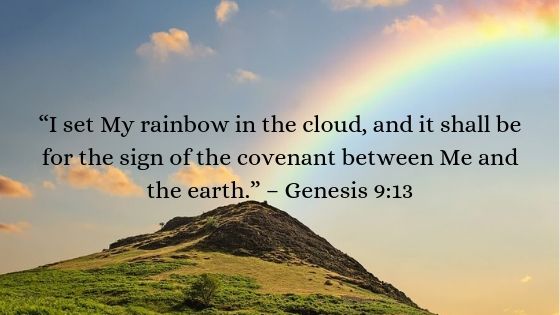God's Covenant with Noah
Genesis 8:1–9:17
Kevin's Commentary
You are encouraged to go through steps or process scripture in these steps:
- Pray = in anticipation of what God wants you to discover. Thank God for his constant and good care for the earth which he so lovingly created.
- Read = with purpose look for what God is trying to communicate. You may want to read out of several translations and highlight key words.
- Reflect = on the context and put yourself in the shoes of people at that time. What do you think of when you see a rainbow? What promises of God are special to you? What reminds you of them?
- God is ... What do we learn about God?
- We are ... What do we learn about people?
- Apply = information without application is fruitless. Decide on some practical steps you can take for fulfill what God wants you to do. What is one way you could care for the earth today? As you do, make it a time of silent prayer for the wonders of creation.
- Pray = yielding to God to empower you to do what the word convicted you to do. Thank You, Lord, for keeping Your promise to care for earth. Show me what more I can do to care for it.
For deeper Bible study and more resources go to my Commentary Blog notes.
#Covenant
(Genesis 9:8-17)
The covenant is a key to grasping what the Old Testament teaches about the character of our God. In Old Testament times a covenant (Heb. brit) was a formal contract, intended to make an agreement legally binding. In international affairs a covenant was a treaty. In a nation's life it served as a constitution. In business a covenant was a contract. In personal relationships it was a commitment.
Most covenants in ancient times were two-party agreements. That is, each person or group involved specified what he or she would do to carry out the agreement. If one side failed to perform, the agreement was broken, and the other side was no longer obligated.
But look at God's covenant with Noah. It is pure promise! God made no conditions. There are no "ifs." Instead God simply said, "I now make a commitment to you and your descendants. Never again. Never again will there be a flood to destroy the earth." Whatever humanity may do, God remains committed to this promise made to Noah.
The text tells us that the rainbow is to serve as a reminder to God of this specific covenant promise. But the rainbow means something else to us. Rather than a reminder of a specific promise, the rainbow is a reminder of the character of God and the nature of our relationship with Him. The rainbow reminds us that God comes to us with promises, not demands; that God in grace makes commitments to us that do not depend on our performance. We may fail God, but God will never fail us.
Only in Jesus do we fully understand. Only in Christ's promise of eternal life to all who trust Him do we grasp the full wonder of God's grace. Yet we sense something of it here in Genesis. And each time we see a rainbow, we are reminded. The God who promised to never again destroy all life with a flood is the God of promise, the God of grace. The commitments that He makes to us in Christ are promises that will never fail.
Personal Application
The next time you see a rainbow, let it remind you of God's amazing grace.
Quotable
"God did not make the first human because He needed company, but because He wanted someone to whom He could show His generosity. God did not tell us to follow Him because He needed our help, but because He knew that loving Him would make us whole."


No comments:
Post a Comment
Only messages that fulfill the purpose of this blog are allowed.